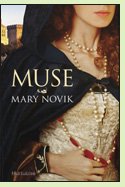Muse
by Mary Novik
Reviewed by Margaret Tomlinson

Filled
with sensory detail, Muse imagines
the life of the unknown woman who bore a son to the fourteenth-century poet
Petrarch. A scholar and philosopher influential in the development of humanism,
Petrarch was and is most renowned for his numerous poems, masterpieces of
poetic form, about his unconsummated passion for a married woman named Laura. He
saw her in a church when he was in his early twenties and wrote about her until
her death twenty-one years later, and after. What must it have been like to be
the woman he actually bedded, who bore his son?
Muse gives her a name, Solange, and portrays her as a prostitute's illegitimate child raised in a convent after her mother's death. The abbess hopes her apparent gift of prophecy will benefit the convent. Solange is more interested in her work in the scriptorium, where she develops skills which, when events take her away from the convent, attract Petrarch's attention. If her profession as scribe is unusual for a woman of her time, the perils she faces as an unmarried woman in a man's world are not. She and Petrarch become lovers, but without a church-sanctioned marriage she cannot rely on him to protect her.
The novel's setting is Avignon, where Petrarch grew up and spent most of his younger years, and where seven fourteenth-century popes resided after Clement V, a Frenchman, decided to stay there rather than move to Rome. The cast of historical characters includes Petrarch, as devoted to his much-used copy of St. Augustine's Confessions as he is to more secular passions; Petrarch's rascally brother Gherardo and friend Guido; two popes; and Laura de Novis, who may have been the Laura of Petrarch's poems. All of them, however crucial to the story, are peripheral by comparison with the fictional Solange, whose quick wits, prophetic trances and instinct for survival make her a colorful and compelling character. (2013, 324 pages)
More about Muse at The Book DepositoryOther novels set in fourteenth-century France:
The Lords of Vaumartin by Cecelia Holland (1988), about an orphaned nobleman in fourteenth-century Paris. See review or more info at Powell's Books
The Burning Times by Jeanne Kalogridis (2001), about a clairvoyant midwife caught up in the Inquisition in fourteenth-century France. More info
The Iron King by Maurice Druon (1955; also titled The Ardent Infidels), about a French nobleman in the time of King Philippe IV (1285-1314) who believes his aunt has cheated him of his inheritance; #1 in the Accursed Kings series. More info
Poems by Petrarch:
Canzoniere by Petrarch; English translation by J.G. Nichols (2006), poems about Laura. More info
The Essential Petrarch by Petrarch; English translations by Peter Hainsworth (2010), selections from Petrarch's poems, letters and other works. More info
Biography of Petrarch:
Petrarch: Everywhere a Wanderer by Christopher S. Celenza (2017). More info
Online:
Petrarch at Biography.com
Back to Medieval: Fourteenth and Fifteenth Centuries
Back to Directory of Book Reviews